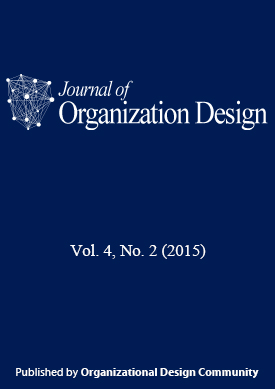Combining Theoretical Perspectives on the Organizational Structure-Performance Relationship
DOI:
https://doi.org/10.7146/jod.16781Keywords:
organization structure, formal organization, informal organization, contingency theory, information processing, social networksAbstract
Much of the literature linking organization structure to performance falls into two broad research streams. One stream concerns formal structure – the hierarchy of authority or reporting relationships as well as the degree of standardization, formalization, specialization, etc. The impact of formal structure and other elements of organization design on performance is typically contingent on factors such as strategic orientation, task characteristics, and environmental conditions. The other research stream focuses on informal structure – a network of interpersonal and intra-organizational relationships. Properties of informal structure are typically shown to have a more direct (less contingent) impact on organizational performance. Despite these pronounced differences in the conceptualization of organization structure, considerable overlap and complementarity exist between the two research streams. In this article, I compare and contrast a pair of exemplars from each stream – the information processing perspective and the social network perspective – with respect to their conceptualizations of organization structure and its relationship to performance. Several recommendations for future research that combines the two approaches are offered.Downloads
Published
2015-08-28
How to Cite
Hunter, S. D. (2015). Combining Theoretical Perspectives on the Organizational Structure-Performance Relationship. Journal of Organization Design, 4(2), 24–37. https://doi.org/10.7146/jod.16781
Issue
Section
Research Article
License
JOD requires that at least one author of each accepted paper sign a Copyright Transfer Agreement form. Copyright will be transferred to Organizational Design Community when the paper has been accepted.
Articles published in JOD are licensed under a Creative Commons Attribution-NonCommercial-NoDerivs 4.0 Unported License.



